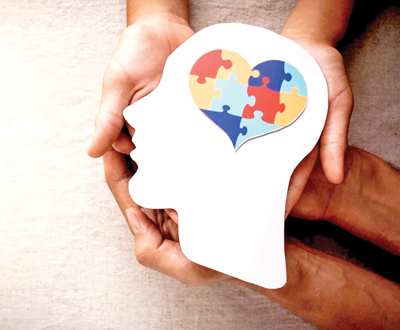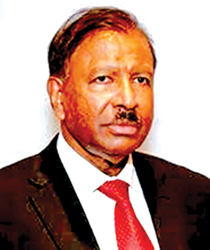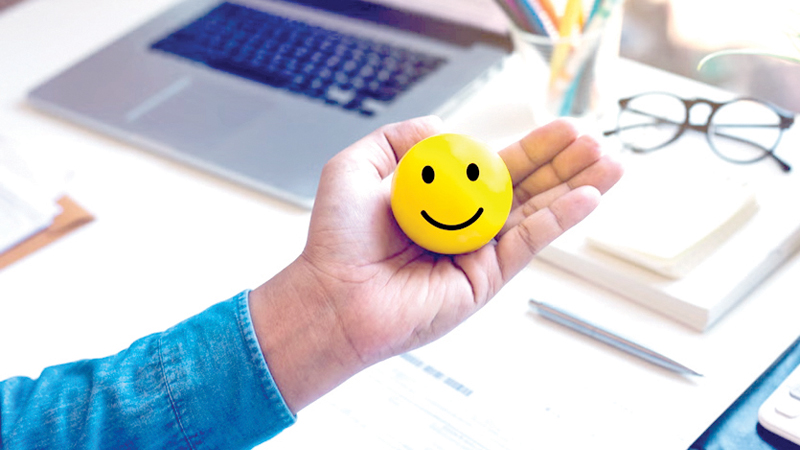 With more and more people working outside their homes both in the formal and non formal sectors in Sri Lanka health officials are raising concerns of the likelihood of several hidden and already existing mental illnesses reemerging with greater force among the Lankan working community.
With more and more people working outside their homes both in the formal and non formal sectors in Sri Lanka health officials are raising concerns of the likelihood of several hidden and already existing mental illnesses reemerging with greater force among the Lankan working community.
The Sunday Observer spoke to Founder Director National Institute of Mental Health and Consultant Senior Lecturer, Kotelawela Defence University, Dr. Jayan Mendis to find out the cause/s that drive these work related diseases, who were most vulnerable for developing them early and most importantly how how such occupational hazards could be avoided with available resources as well as guidelines on simple rules to follow regarding our diet and leading healthier lifestyles.
Q. This year’s theme for World Mental Health Day (WMD) is “Prioritise mental health in the workplace.” What is the significance of this theme to the Sri Lankan working community?
 A: In Sri Lanka, with its growing workforce, prioritising mental health is crucial. Many workers face high stress due to long hours, job insecurity, and limited mental health support at work. This theme is a call to employers to create environments that support mental well-being, ensuring Sri Lankan workers can thrive.
A: In Sri Lanka, with its growing workforce, prioritising mental health is crucial. Many workers face high stress due to long hours, job insecurity, and limited mental health support at work. This theme is a call to employers to create environments that support mental well-being, ensuring Sri Lankan workers can thrive.
Q. How does Sri Lanka rank with other countries with predominant working populations?
A: Sri Lanka has a high employment rate with approximately 8.4 million people employed, predominantly in the service sector (47.1 percent), followed by industry (27.9 percent) and agriculture (25.0 percent). Compared to other countries, Sri Lanka’s employment distribution is similar to many developing nations where a large portion of the workforce is engaged in service and industry sectors.
Q. Unfriendly workplaces, it has been said, can cause several adverse impacts on one’s health. Your comments?
A: Unfriendly workplaces can have profound impacts on both physical and mental health.
Psychosocial risks like excessive workload, poor job control, lack of support, and workplace bullying can lead to stress, anxiety, depression, and burnout. Physically, employees in hostile environments may experience chronic fatigue, headaches, or cardiovascular issues.
A negative workplace culture discourages employees from seeking help, further exacerbating mental health issues. In Sri Lanka, the lack of mental health literacy in workplaces can amplify these effects, making it crucial to foster environments where workers feel safe and supported.
Q. There are evidence borne reports to show that the majority of our local workplaces lack even the basic equipment needed to ensure occupational safety which is a worker’s right and enshrined in the constitution. Do you agree?

Dr. Jayan Mendis
A: Yes, I agree. Occupational safety is not only a fundamental right but a necessity for maintaining physical and mental well-being. Many Sri Lankan workplaces, especially in informal sectors like construction and agriculture, lack essential safety equipment, leading to frequent injuries and accidents. Proper ventilation, ergonomic setups, and basic mental health resources are often unavailable. This not only puts workers at risk for physical injuries but also contributes to psychological stress.
Q. What are the 1) physical 2) psychological and mental impacts of facing these conditions daily have on the worker?
1) Physical Impacts:
Repeated exposure to hazardous conditions can lead to chronic health issues such as musculoskeletal disorders, respiratory problems, and cardiovascular diseases. Long-term neglect of physical well-being due to poor working conditions can also weaken the immune system and result in frequent illness.
2) Psychological and Mental Impacts:
Workers facing high levels of stress daily are more likely to develop stress, anxiety, depression, and burnout. The pressure to meet unrealistic expectations, coupled with the lack of emotional support, can lead to chronic stress, resulting in long-term mental health conditions. In severe cases, these issues can escalate into substance abuse or suicidal thoughts if left untreated.
Q.. Today we are seeing a rapid spike in the number of people working in the informal sector. Many of them are working in gem pits, cleaning cesspits, blocked drains, gutters exposed to all sorts of pollutants. What has the Psychiatric Association of Sri Lanka done to reduce these risks in recent years?
A: The Psychiatric Association of Sri Lanka has been working closely with the Ministry of Health, advocating for improved mental health support across all sectors, including the informal workforce. Initiatives include raising awareness about the psychological impacts of hazardous work environments and offering training programs to help employers recognise early signs of mental distress. Collaboration with public health authorities has also led to community outreach programs that provide mental health resources to informal workers who may not have easy access to healthcare.
Q.. Has there been a change in your approach when dealing with mental illness in recent years given the challenges people face in our modern society? A more holistic approach?
A: Yes, the approach to mental health care has evolved to become more holistic. We now focus not only on treating the symptoms of mental illness, but also on addressing the underlying causes, such as workplace stress, social isolation, and lifestyle factors. Integrating physical health, mental health, and social well-being into a comprehensive care model has become essential in modern psychiatry.
Q. How is mental illness treated?
A: Treatment for mental illness is increasingly tailored to the individual’s specific needs and circumstances. It may include a combination of medication, psychotherapy, lifestyle changes, and support from family and community. Holistic approaches consider the whole person, incorporating mindfulness, yoga, and other practices.
Q. What are the symptoms to look for in a person who you think may have a mental illness?
A. Symptoms of mental illness can include persistent sadness, excessive worry, changes in mood, withdrawal from social activities, irritability or heightened emotional responses, unexplained changes in eating or sleeping patterns, difficulty concentrating or performing daily tasks, feelings of hopelessness, worthlessness or guilt, and thoughts of self-harm or suicide.
Recognising these early signs and seeking professional help is key to managing mental illness effectively.
Q. Can anyone of any age get a mental illness?
A: Yes, mental illness can affect individuals of any age. Children, adolescents, adults, and the elderly are all susceptible, although the types of mental disorders and their manifestations may differ depending on the stages of life. For instance, anxiety and behavioural disorders are more common in children while depression and dementia are prevalent in older adults.
It is important to recognise and address mental health issues early to provide appropriate support and treatment.
Q. Who are those most vulnerable to developing a mental illness age wise and gender wise? Why?
A: Young adults aged 18-25 years and females are generally more vulnerable to developing mental illnesses. Adolescents and young adults face significant stresses of school, work and life transitions. Hormonal changes and societal pressures contribute to higher rates of anxiety and depression in females while males mostly struggle with substance abuse and may be less likely to seek help.
Q. Gaps you see in our present health system that prevents patients getting quality care?
A. Key gaps include inadequate mental health resources, lack of mental health professionals, stigma surrounding mental health, insufficient public awareness and insufficient integration of mental health services into primary care. These gaps hinder access to timely and effective treatment.
Q. Your message to all Sri Lankan workers out there?
A: Prioritising mental health is key to your overall well- being and productivity. Mental health isn’t something that should only be addressed in a crisis but should be an everyday priority for a healthier, more balanced life. Here are some essential dos and don’ts to keep in mind:
Do’s:
1. Take regular breaks:
Taking short, frequent breaks can help reduce stress and maintain focus. Even a 5-minute walk or deep breathing can make a huge difference in preventing burnout.
2. Manage your workload:
Know your limits. IYou can only deliver quality work when you’re not overwhelmed.
3. Seek help early: s. Reach out to a colleague, manager, or mental health professional.
4. Practise self-care:
Make time for activities that relax and energise you, whether it’s spending time with loved ones, engaging in hobbies, exercising, or simply resting.
5. Know your rights:
Be aware of your rights regarding mental health and occupational safety in the workplace. The law protects your mental well-being, and you are entitled to work in an environment that supports your mental health.
Don’ts:
1. Don’t ignore early signs of stress:
Ignoring feelings of stress or anxiety can lead to more serious mental health issues down the line.
2.. Don’t stigmatise mental health: Mental health problems are not a sign of weakness. Avoid negative or judgmental attitudes towards mental illness, as they can discourage others from seeking help. Instead, foster an environment of understanding and empathy.
4. Don’t isolate yourself:
It’s easy to withdraw when feeling stressed or overwhelmed, but isolation can worsen mental health issues. Stay connected with your colleagues and loved ones and share your struggles with those who can offer support.
5. Don’t take on too much:
Learn to say no when you’re at capacity. Taking on too much can lead to burnout and negatively impact both your mental health and your work performance.
6. Don’t overlook the importance of sleep and diet: Mental health is closely linked to physical health. Ensure that you are getting adequate sleep and eating a balanced diet, as both are critical for maintaining mental resilience.









